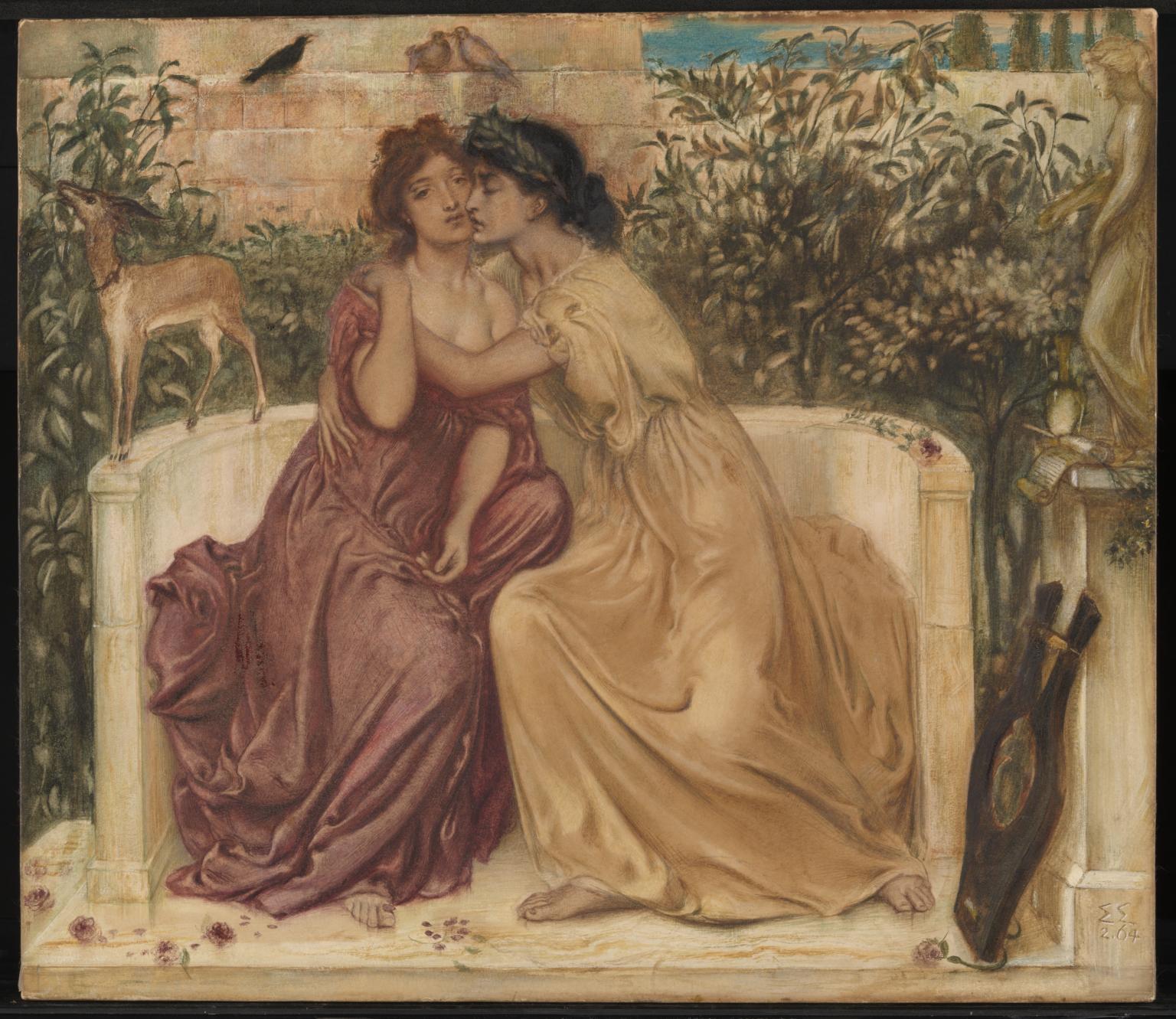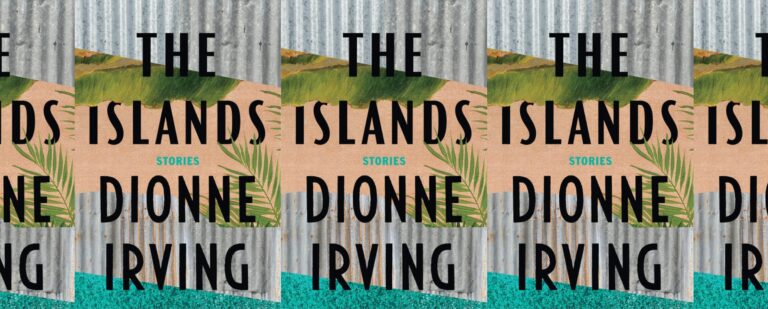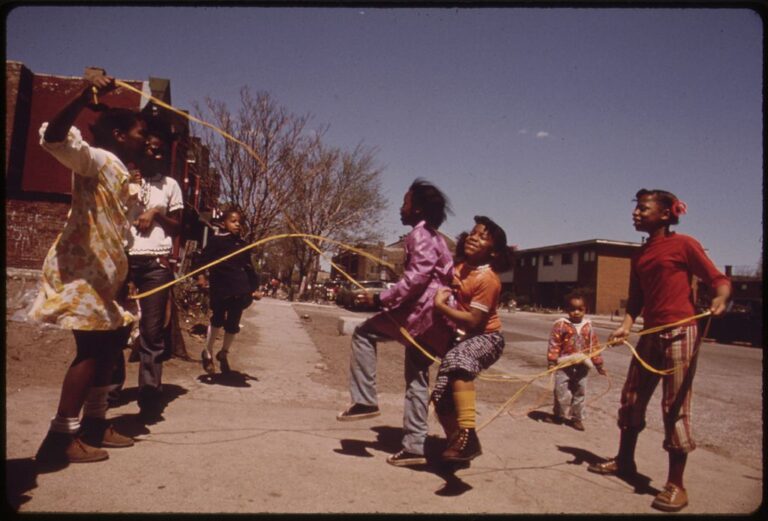Language and the Experience of Desire

A few summers ago, I found myself tongue-tied on a first date. As I struggled for the right words, I folded cocktail napkins into sailboats to occupy my hands. I was spending a few weeks away from London back in my home country of Belgium, and had ended up on an evening out with a beautiful artist in a Bruxellois brasserie—the kind of café with fifty beers on tap and a secret smoking room in the back. We shared small pints of strong Duvel and a fondness for the bruised romance of Jacques Brel songs. Although there was an undeniable spark between us, nothing I said seemed to capture the playful energy I wanted to convey. My heart raced, but my words lagged behind. I felt unable to flirt in Dutch, as if the vocabulary lacked the sensual charge that comes naturally to me in English.
When I’m in London, flirting tastes like the first day of Spring: it imbues the air with possibility, and teases out a linguistic recklessness in me. Flirting makes me feel alive. I find pleasure in the potential of the words and in the anticipation between the lines. While exploring desire in my adopted English might be exhilarating, capturing the same vivacity in my first language proved to be a challenge. In Dutch, I seemed to inhabit a less sensuous version of myself. After that first date, I became determined to uncover the same level of ardor in my mother tongue. Not for any reasons related to dating per se, but more so as a way to overcome the guilt and shame I felt at failing to express a part of myself in my native tongue.
Language is intrinsically linked to the way we perceive ourselves. Our mother tongue is often thought of as the language of the true self, as the primal vehicle that reaches our core. So how does the expression of desire in another language influence our overall sensual identity? Can we even convey pleasure with the same fervor in different vernaculars?
At age seventeen, I moved on my own from a small village in Belgium to London, to study English literature at university. With this move came a coming of age— amplified by the possibilities of life in a foreign city and another language. My experience mirrored that of the young Anaïs Nin: after moving to the United States from France, she began her new life in New York City using English, only reserving her native French to communicate with her father through letters. By 1920, she had completely switched her diary to English, and a few years later she began writing and publishing her short stories and erotica in her adopted tongue as well. She declared that the joy she found in this new vernacular was like “the discovery of a new world, really a new state of consciousness. A new word to me was a new sensation. Reading the dictionary, anything at all, can add not only to your knowledge but also to your perceptions.”
In her 1964 book, Collages, she describes one of the characters as being “dressed in rutilant colors.” Nin received criticism for her choice of “rutilant” over “gold,” but she refuted this in an interview, stating that “rutilant isn’t gold. It’s red and gold mixed. So, you see, you discover a word and that gives you a new perception. . . . As a foreigner, you explore the language because you don’t take it for granted. You have to study it.” My transition to England did just that: it offered me an unparalleled sense of freedom to explore. Nin argues that we belong in certain countries more by temperament than by birth, and moving to London felt like coming home. I grew from a shy and studious teenager into a more confident, outspoken young adult; I was emboldened by the independence of metropolitan university life and the opportunities that a new tongue offered. While Dutch was the language of my awkward, fumbling, teenage angst, English liberated me from those loaded emotional connections. Like Nin, English felt “rich, fertile, subtle, airy, fluid” to me. In it, I found space to shape the kind of adult I wanted to become, away from the restrictions of small-town Flanders. I started to engage with the world in a more open, daring way. The looseness of the English context heightened the language’s potential for feeling. In turn, I became more extroverted.
Many bilingual speakers share this sentiment. They report feeling different or even shifting personalities entirely when switching languages. Recent psycholinguistic studies argue that this adaptation most likely has far less to do with the intricacies of grammar and vocabulary than with the environments associated with the language itself. A tongue enfolds a culture’s centuries of history, myths, and idiomatic quirks; these, in turn, influence our emotional experience. The context and age of language acquisition also play a key role. Yet I felt that the logo-erotic duality within me surpassed these parameters.
The year I moved to London, I fell in love for the first time. The intensity of obsession eclipsed everything in my life up to that point. For months, I let the feeling consume me. I documented every late-night meeting in my journal, analyzed every kiss, described the shape of our entwined limbs, and wrote endless love letters that I would never end up sending—all in a frantic, feverish English. First love has a way of convincing someone that they must be the only person to ever undergo this earth-shattering, cosmic shift. We turn to art to make sense, to escape, to hear echoes of our experiences in order to process them. When I discovered Nin’s work around this time, her unexpurgated diaries guided me through this newfound desire in a country that was only just becoming my own.
Love in a new tongue overflows with romantic potential—it signifies a sublime hunger. There is a willingness to fill one’s mouth with another’s words, suggesting pliancy and openness to enticement. Nin describes how she “thought the word ‘you’ was the most beautiful thing [she] had ever heard” in English, reflecting the erotic receptiveness of a new tongue. Her description of a new crush equally crackles with desire: “The fire of it. Fire. Fire. Fire. A human fire. Everything was transfigured. All the feelings one has at the beginning of love, a love of the whole world, ecstasy. I was ill again, with the grippe, feverish, but I didn’t care. . . . [We] produce this white heat all the poets and all the lovers dream of, this raging fire, heaven and hell.” Nin’s unusual cadence lends a unique quality to both her fiction and her journals. Her writing possesses a distinctly erotic charge, often described as English written in the French style. It mirrored the way I voiced my feelings in English: idiosyncratic terms and incorrectly applied words snuck in on purpose. I found a poetic freedom in trying to capture untranslatable words or idioms. I played with familiarity and distance. Nin often assigns a gender to gender-neutral nouns, as if echoing the French, or transgresses the boundaries of the body into the realm of nature and the Catholicism of her childhood. In Delta of Venus (1974), a posthumously published short story collection, she describes how, in the 1940s, “the language of sex had yet to be invented, and the language of the senses was yet to be explored.” Nin takes on that challenge, offering an alternative way of seeing the erotic. Her multilingualism lends an obliqueness to her writing and incorporates traces of the Other. She draws attention to the opacities between her languages before pushing their limits.
Sex, to Nin, is semantics. Both involve the mouth and the tongue, generating an explosion of passion, emotion, and sound:
Listen to me, you English readers. . . . If you would accustom your ears to my scales, to my great variations, wavelengths, how light you would grow, what worlds you would discover! I could make you sensitive all over, thin your skin, sensitize your senses—if you let me! . . . Proust has not penetrated you. You cannot read Giraudoux. But I speak your language—the language of the potential you.
My experience of first love awoke something equally primal inside of me. I felt driven to convey it with the same vigor and rigorousness I had found in Nin’s work. To give voice to the body, I molded the English lexicon into my own version—that of a lover, a reader, a writer. I submitted to the words with wild abandon. If language empowers us in the experience of pleasure, then being creative with our tongues makes space for the imagination in desire.
English had become the tongue I made love in and made love to.
After Nin, I turned to Hélène Cixous’s essays on “l’écriture feminine” to further understand the inscription of a woman’s body. Like Nin, Cixous challenged women to write themselves out of the world that men had constructed for them, urging that “your body must be heard.” But Cixous goes beyond this, positing what she refers to as the “other Bisexuality.” She articulates her wish to experience a kind of love made possible in a world without the male/female division, which resonated deeply with me:
I want all. I want all of me with all of him. Why should I deprive myself of part of us? I want all of us. Woman of course has a desire for a ‘loving desire’, and not a jealous one. But not because she is gelded: not because she is deprived and needs to be filled out, like some wounded person who wants to console herself or seek vengeance. . . . I desire the other for the other, whole and entire, male or female; because living means wanting everything that is, everything that lives, and wanting it alive. . . . What’s a desire originating from a lack? A pretty meagre desire.
In this sense, the “other Bisexuality” departs from the binary, and moves beyond the Lacanian notion of desire based on lack, instead focusing on desire as a whole. This sentiment mirrors Nin’s sexual awakening in Henry and June: From a Journal of Love: The Unexpurgated Diary (1931-1932) of Anaïs Nin (1986), in which she describes falling in love with both Henry Miller and his striking wife June, who was “the only woman who ever answered the demands of (Nin’s) imagination” up to that point.
Discovering these texts was a formative experience for me. Although I’ve sensed this free, dynamic approach to sexuality within me for as long as I can remember, it wasn’t until I read Nin and Cixous’s work that I felt able to unearth it. Their bilingual/bisexual expression uncovered a part of my identity that had been speechless within—until I was able to craft the lexicon to articulate it. I could capture all its shades of dark and light, soft and hard; I could capture the romantic within the Germanic.
In order to overcome the feeling of exile from my own native language, then, I had to apply the same framework. To be able to flirt in Dutch, I had to figure out how the sensuality within its literature spoke to me. This notion of (re-)acquiring a new vernacular through the power of writing is most prominent is Cixous’s literary relationship with the Brazilian writer Clarice Lispector.
Although Lispector was already one of Brazil’s most celebrated novelists at the time, Cixous helped to call international attention to her work. In Cixous’s bilingual essay “Vivre L’Orange/To Live the Orange,” she writes a paean to Lispector’s writing. It is a highly intimate love letter with powerful visual imagery, appealing to the reader’s senses. She speaks of Lispector’s voice, and allows it to resonate through her own. The love she feels for the Brazilian writer infuses every page with an almost religious fervor: “Then she showed me a fruit, which had become foreign to me, and she gave me back the sight of this fruit. She read it to me, with her humid and tender voice, she called it naranja, she translated it, into my tongue, and I rediscovered the taste of the lost orange, I re-knew the orange.” “Vivre L’Orange” begins with the narrator’s incapacity to talk and write, and moves to her discovery of her own voice through the experience of letting the other speak. Lispector had indirectly provided Cixous with a voice—an external authority—within which to speak of her own ideas, obsessions, and dreams.
In the same way that these writers had guided me towards my English voice, I turned to Dutch literature in search of its sensuality. I devoured poems by Lucebert and Hugo Claus. I found the fire within the novels of Kristien Hemmerechts. I even listened to the handful of songs that Jacques Brel had recorded in Dutch—his second language—in which he established a quiet but fierce eroticism. For the first time, I approached my mother tongue with the same wonder and generosity that I had first offered to the English language.
The process took time. It took more than a few tongue-tied dates. But gradually, I began to taste the sensuous umami flavor of my native language. I could find pleasure in hearing the word goesting (an intense craving) on someone else’s lips. I found it invigorating to refer to someone as liefje (my darling, my love). The first time my whispers in Dutch made someone blush felt like a milestone. I still don’t inhabit the same level of sensuous comfort that I do in English, but I enjoy the process of discovery, of breaking the rules, of finding new ways to bend my own language.
I now appreciate that the looseness of my mother tongue will always manifest itself more prominently in other areas of my life. In Dutch, I feel like a more caring, gentle, and nurturing person. Recently, after adopting a puppy in London, I noticed that I spoke to her in Dutch without thinking, cooing over first milestones and singing her to sleep in the first few weeks of crate-training. I hold my friends’ newborn babies, and the first words that come to me—no matter which country I’m in—will always be in Dutch. I whisper soft Flemish nicknames and choose soothing nursery rhymes that are a familiar shorthand from my childhood in Belgium. In this sense, I’m comforted by the fact that I can do justice to my mother tongue in a different, though equally primal, way.
Language undoubtedly has the power to shape our sense of self. The great joy of falling in love in English for the first time is that it uncovered a part of my identity that otherwise may never have surfaced. It’s sensitive and sensuous, expressive and open. It feels as if my tongue had already discovered all of the secret places that my mind had not (yet) reached. Perhaps the English language didn’t so much discover this part of my identity, as played a part in creating it.
In loosening my tongue ties to love, I felt empowered to explore my first language with a fresh perspective. I found new depths of sensual, emotional potential in the reservoir of my native tongue. Although this feels different from the wild, undammed river currents of my beloved English, it is proving to be a freeing new kind of swim nonetheless.


